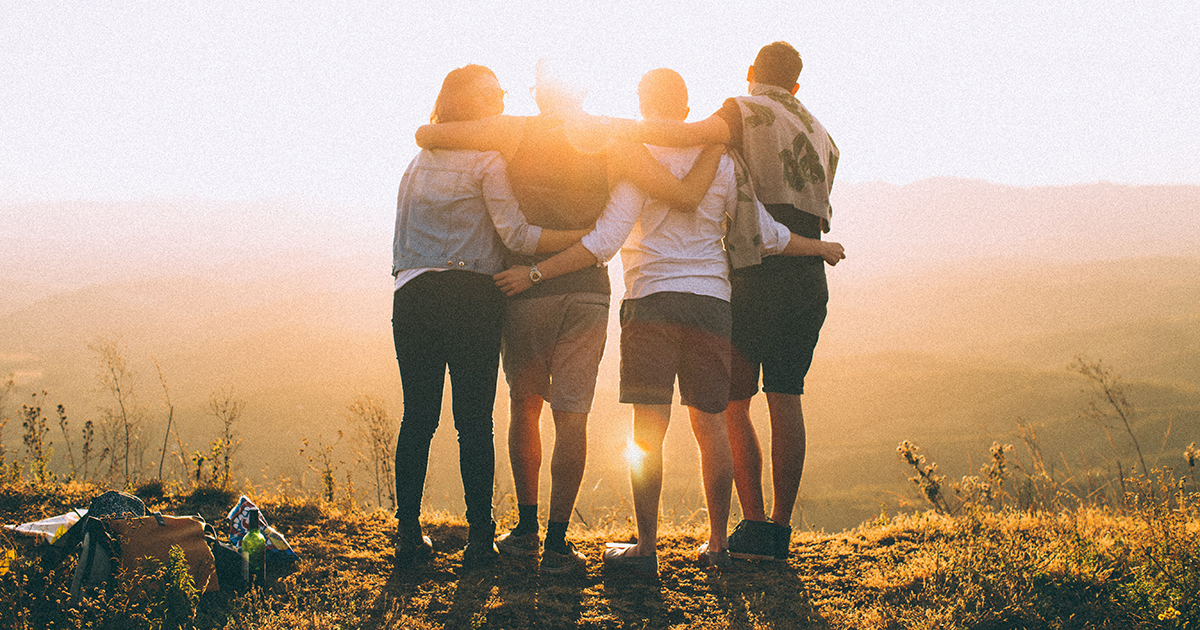Recently, my husband and I talked about adult friendships, and if it was harder for us to make friends as adults. We both agreed that it is more challenging to make friends as “grown-ups.” The way we make friends has changed. We don’t get to spend time with friends on the playground or in the classroom anymore.
Also, our adult friends have commitments like:
- jobs,
- partners,
- kids,
- aging parents,
- time constraints,
- and more.
Add a global pandemic into the equation and making friends seems even harder. Or is it?
After exploring the research on friendship, I learned that I can make friends (and close friends) as an adult. In this article, I’ll share an overview of my learnings from the research on friendship, and creative tips to help you make good friends.
With that, let’s dive in!
7 Creative Ways To Make New Adult Friendships.
During the COVID-19 pandemic, I devoured books, articles, and podcasts about strong friendship. The stories I consumed gave me tools to strengthen my existing friendships and make new friends.
Below you’ll find a list of tips that have helped me make new friends. I hope they help you, too!
1.) “Make a hobby a community.”
In a recent interview — psychologist, researcher, and author — Dr. Marisa Franco said, “make a hobby a community.” Pick a hobby you enjoy — like knitting, cycling, walking, or reading — and find a group to join.
This is a great way to meet new friends and different people, and it’s especially helpful if you are busy (with less time for a full social life). You’ll have a recurring event on the calendar, spend time doing something fun, and you’ll make new friends.
2.) Attend events, classes, or volunteer.
Attend local events, classes, workshops, and build skills by volunteering. This is a great way to make new friend connections, and expand your knowledge and interests. This will naturally help you create a sense of belonging too.
For instance, I’m volunteering at a local hospital. This is way outside my comfort zone, and it’s been so rewarding. I’m helping patients in small ways, and meeting new people.
If you can’t find local events or classes in your community, start a meet-up!
3.) Talk to people.
When you get to an event, class, or workshop, talk to people. Don’t sit in a corner or look at your phone. Instead, engage with the people around you. Ask questions and listen. This is one way to make folks feel seen and heard.
For example, at a recent training, I asked fellow volunteers about their background and interests. I felt nervous to start conversations, but it was rewarding and I made new connections.
4.) Meet and make friends on the Internet.
I’ve met some of my closest friends and made some good friendships through my old blog. A lot of my friends live in different states or countries, so it can take effort to stay connected. Over the past decade, I’ve continued to cultivate my long-distance friendships through phone calls, email, and text messages.
You could also try the social network, Bubble BFF. It’s an app designed to help adults make friends. I’ve had a few friends use the app with success!
5.) Consider your loose connections.
When I moved to Chico, CA, I started going to work events with my husband. It was a great way to meet people. For instance, a new friendship was sparked at a work event in 2018. Since then, we’ve gone on weekly coffee dates. This is all thanks to my husband’s loose connections at work.
Consider these questions: Who is in your friend circle or neighborhood? What ties have you already established? Have overlooked people in your circle that could be fun to spend time with?
6.) Be a matchmaker.
Use your connections to help friends meet and make new friends. For instance, I loved reading about Aminatou Sow and Ann Friedman’s friendship story. A friend set them up on a date, and they’ve had a “big friendship” ever since!
7.) Say hello.
Say hello to people at the grocery store, in a waiting room, or at a work event. As Dr. Franco said, “Trust the spark.”
If you like someone’s energy, ask them if they’d be willing to exchange contact information. From there, you could go for a walk, meet up for coffee, or volunteer together. The possibilities are endless!

How to Strengthen Your Adult Friendships (even when life gets busy)
Friendship in adulthood takes work, and it doesn’t happen organically. Also, research suggests that putting effort into your friendships will help you struggle less with loneliness over time.
Below you’ll find ideas to strengthen your friendships (even when life gets busy). For example, I use the tips below to nurture my friendships. Consider using the tips daily, weekly, monthly, or quarterly.
1.) Create a “Friend Hour.”
During the height of the pandemic my friend Shanna wrote an essay titled —”Brave New World: Social Distancing Edition.” In the article, she encouraged readers to create a “friend hour.”
Shanna said, “Consider creating a friend hour once a week, where you gather with a few friends via Skype or FaceTime to discuss how you are managing and to share the things for which you are grateful. Use this time to practice deep listening and to develop your empathy skills (those traits will serve all of us now, and when this thing is over).”
During the pandemic, I scheduled lots of “Friend Hours.” I’ve continued this practice. Talking with friends on the phone is fun, and it strengthens my relationships.
2.) Go on friend dates.
Friend dates are delightful! For example, I have a standing weekly date with a close friend. We drink delicious coffee together and talk about work, relationships, and more.
Other friend dates I enjoy: going out to dinner, taking walks or bike rides, or looking for good reads at the library or bookstore.
3.) Plan a trip.
Planning and going on trips with friends is a wonderful way to connect. For example, I traveled to Europe last year; an adventure I called “The Friend Tour.” It was a joy to see our friends in real life and be tourists together. Traveling with friends is a gift — and privilege — that I don’t take for granted.
Also, I go on day trips with friends. This is a simple way to connect and strengthen personal relationships; especially when life gets busy.
4.) Send a postcard.
In the age of all things digital, it’s magical to receive and send mail. I send postcards to my friends frequently. It’s a simple way to say hello, to show my affection, and express gratitude for our friendship.
I love digital communication, too. For example, texting friends regularly is something I enjoy. For me, texting is like sending tiny digital postcards. It helps me nourish healthy friendships.
5.) Bring friends into your daily life.
Ellie Hughes shared so many excellent ideas in –“How To Cultivate Friendships Without Spending Money To Go Out.” One of my favorite tips: “Weave friends into the fabric of daily life (and get you out of the house!).”
I can’t wait to put this idea into action. Doing errands, workouts, and cooking together with friends will be fun! Plus, it’s a great way to save money, improve my mental health and deepen my connections.
6.) Show your affection and communicate.
Dr. Franco encourages readers to show friends affection. Her ideas are simple and powerful. Dr. Franco said:
“Tell them how much they mean to you. When they reach out, tell them how happy you are to hear from them. Be excited at their good news. Compliment them. Praise their hard work. Greet them warmly. Let them know when they share something meaningful with you. Smile at them genuinely. Remind them you are grateful to know them. Tell other people how great you think they are. Tell them they’ll succeed in reaching their dreams.”
Communication is the key to strengthening adult friendships. With friends, it’s essential to show your love, vulnerability and talk about hard things, too. Doing both has made my big friendships even bigger.
7.) Follow through.
If you offer to help a friend, follow through with the offer. That could include: helping a friend move house, having weekly calls, or picking their kid up from school.
Following through is an act of compassion and affection. It also shows friends that you care about their overall health and well-being.
Resources and Questions About Adult Friendships
Think of my essay as an introduction to making and keeping friends as adults. If you’re looking for resources, or have questions, explore the resource list below.
Read
- Platonic: How the Science of Attachment Can Help You Make — and Keep — Friends by Dr. Marisa Franco
- Big Friendship: How We Keep Each Other Close by Aminatou Sow and Ann Friedman
- Friendship: The Evolution, Biology, and Extraordinary Power of Life’s Fundamental by Lydia Denworth
Listen
Join
- Find a walking group in a city near you or join “City Girls Who Walk.” The group was created by Brianna Joye. In a recent Instagram post, Joye said, “Today I learned that around 90{a88c2e440a3fe0d009682811ffc0ce83172d8ed124d1bbbcc9619763e6f2b009} of you come to these walks alone & leave with at least 1 new friend! That made me just so happy!”
- Join the “The Literary League.” It is an “in-person and digital book club, with chapters from Washington to Maine (Canada, too!), all connected by readers and their love of books.”
Give these recommendations a try with old friends, romantic relationships and even with casual acquaintances. You never know when when a social connection will bloom into lovely, close friendship.
